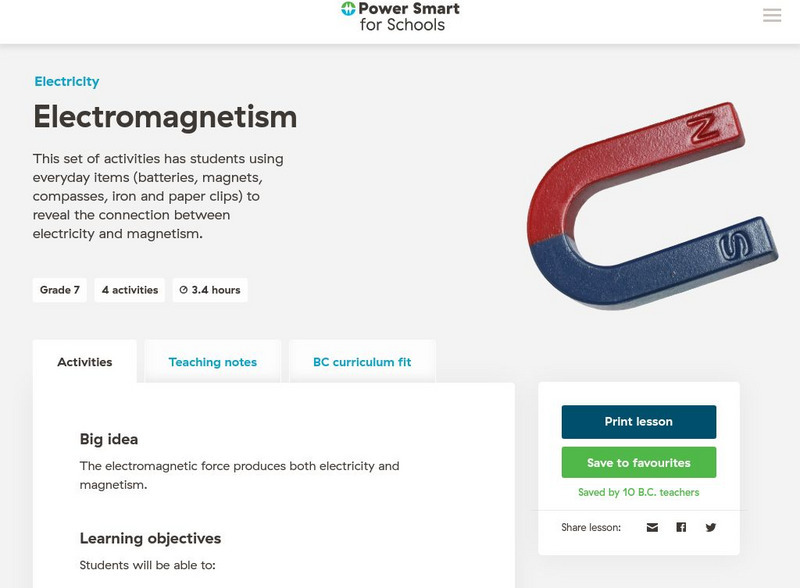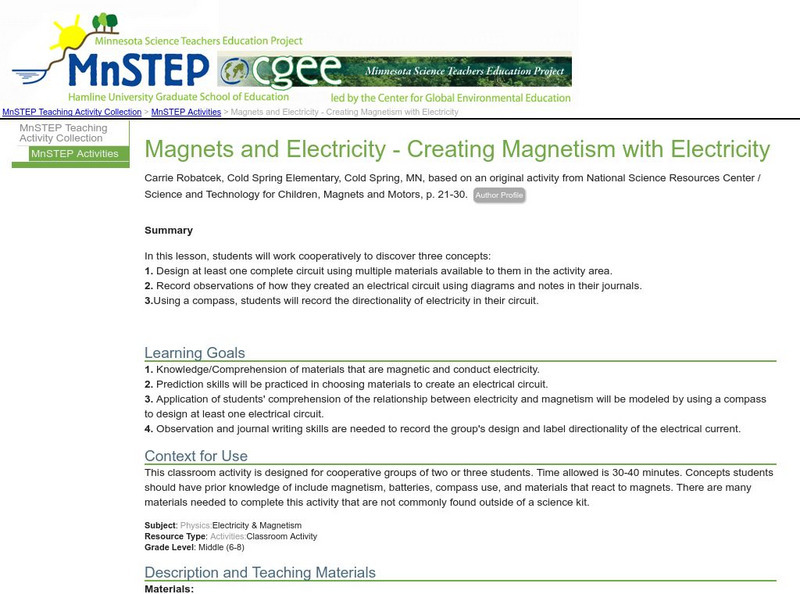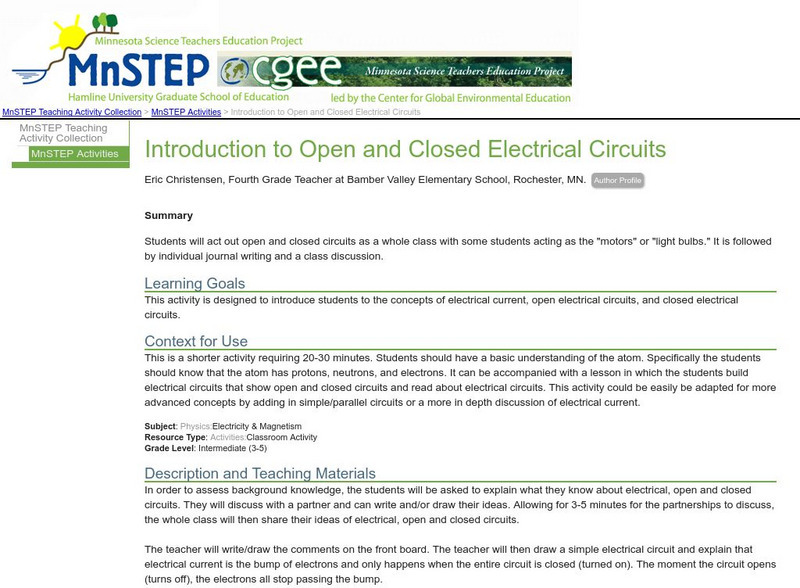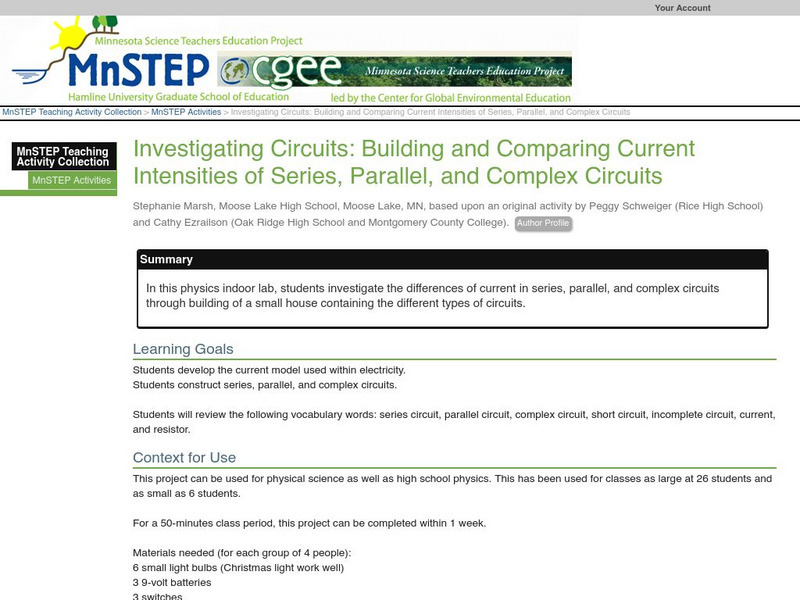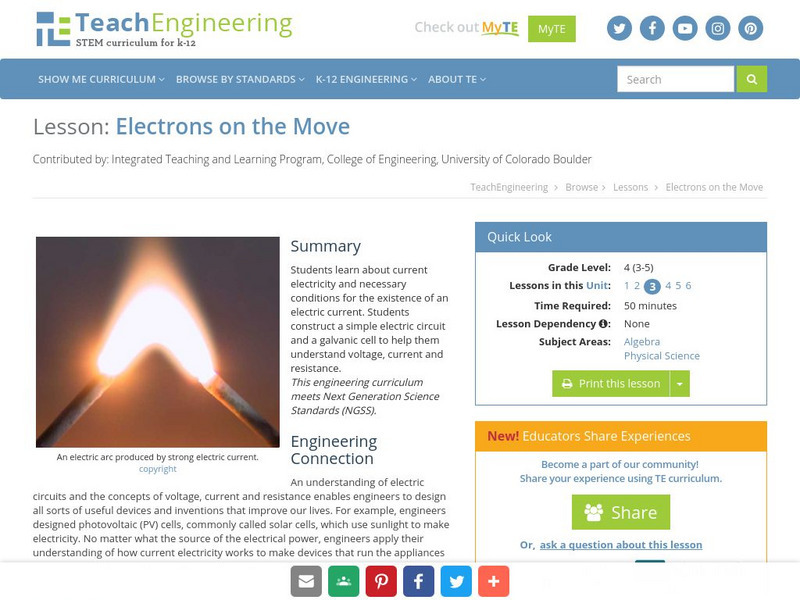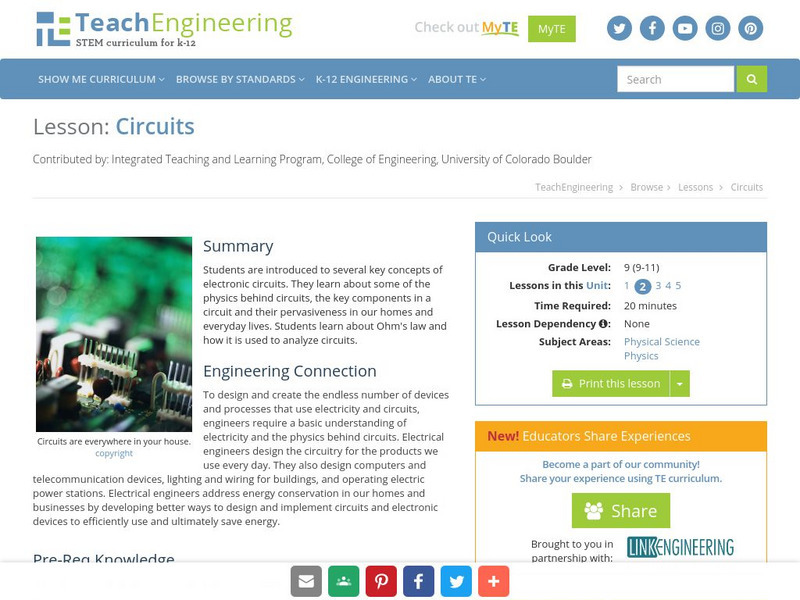Hi, what do you want to do?
Curated OER
How We See Things
Students explain that mirrors reflect light. They examine how when a beam of light is reflected from a surface, its direction changes.
Science Education Resource Center at Carleton College
Serc: Investigating Electricity: Building Circuits in Elementary Science Class
In this exploration activity, students compare the difference between series circuits and parallel circuits using wire, light bulbs, and D batteries.
Science Education Resource Center at Carleton College
Serc: Investigating Electricity
In this interactive activity, students will explore electricity and be able to design and create a complete electrical circuit. Students will also learn what is necessary to light a light bulb. Creative thought, ideas, and, brainstorming...
TryEngineering
Try Engineering: Flashlights and Batteries
Students work in teams to explore how a flashlight works. This activity examines the topics of batteries, electron flow, circuit systems, switches, and bulbs.
Science and Mathematics Initiative for Learning Enhancement (SMILE)
Smile: Electric Currents and Circuits
This cooperative learning activity for intermediate to junior high pupils has them create various electrical circuits in order to understand electricity.
Other
Bc Hydro: Power Smart for Schools: Electromagnetism
This set of activities has students using everyday items (batteries, magnets, compasses, iron and paper clips) to reveal the connection between electricity and magnetism. Ideally, students will already have experience building simple...
TeachEngineering
Teach Engineering: How Does a Robot Work?
This instructional activity introduces electricity, batteries and motors using a LEGO MINDSTORMS NXT robot. The associated activity guides students to build a simple LEGO NXT set-up and see the practical implementation of the concepts...
TryEngineering
Try Engineering: Electric Switches
Lesson focuses on how switches control the flow of electricity. Students are posed with the challenge of designing and building a simple switch into an electric circuit.
American Geosciences Institute
American Geosciences Institute: Earth Science Week: Mineral Electrical Conductivity
The purpose of this activity is to test the conductivity of various minerals with a simple electrical circuit and draw conclusions about which ones would be used in electronics.
TryEngineering
Try Engineering: Series and Parallel Circuits
The core of this lesson is simple circuits and the differences between parallel and series circuit design. Students perform experiments to test the differences between the two circuit designs using low voltage light bulbs.
TryEngineering
Try Engineering: Electric Messages: Then and Now
Lesson investigates electronic communication from the Morse Code system to text messaging. To learn about this, students construct simple circuits, send messages to each other, and explore the history and impact of communication.
Science Education Resource Center at Carleton College
Serc: Magnets and Electricity: Creating Magnetism With Electricity
Students will work in small groups to design at least one complete circuit using multiple materials. They will record their observations of how they created an electrical circuit using diagrams and notes in their journals. Using a...
Science Education Resource Center at Carleton College
Serc: Lighting the Way: Electrical Circuits and Lamp Wiring
Through a series of self-guided activities, students will explore basic electrical circuits and then build a working model of a circuit through the process of wiring a lamp. They will understand the flow of electrons through a circuit,...
Science Education Resource Center at Carleton College
Serc: Introduction to Open and Closed Electrical Circuits
This activity introduces students to the concepts of electrical current and open and closed circuits. Students will act out open and closed circuits as a whole class with some students acting as the "motors" or "light bulbs."
Science Education Resource Center at Carleton College
Serc: Comparing Current Intensities of Series, Parallel, and Complex Circuits
Students will investigate the differences of current in series, parallel, and complex circuits through the construction of a small house containing the different types of circuits.
TeachEngineering
Teach Engineering: From Sunlight to Electric Current
The lesson will first explore the concept of current in electrical circuits. Current will be defined as the flow of electrons. Photovoltaic (PV) cell properties will then be introduced. This will lead to the principle of "Conservation of...
Science and Mathematics Initiative for Learning Enhancement (SMILE)
Smile: Series and Parallel Circuits
A teacher lesson plan which could be easily converted into an idea for a student project or presentation. Ideal for pre-high school students. This page describes an activity in which the history of electric circuits, the nature of...
Science and Mathematics Initiative for Learning Enhancement (SMILE)
Smile: Batteries and Bulbs
For the teacher planning a lesson plan or for the student preparing for a project or presentation. This page describes an activity in which parallel and series circuits are constructed using batteries and bulbs. Complete activity...
Science and Mathematics Initiative for Learning Enhancement (SMILE)
Smile: Resistances in Series and Parallel Circuits
A teacher lesson plan is provided here. This page describes two activities in which the effect of multiple resistors on the current and overall resistance of both series and parallel circuits are investigated. Complete activity...
TeachEngineering
Teach Engineering: Electrons on the Move
Students learn about current electricity and necessary conditions for the existence of an electric current. Students construct a simple electric circuit and a galvanic cell to help them understand voltage, current and resistance.
BioEd Online
Bio Ed Online: Neural Network Signals
Nervous system messages are sent as electrical signals along the length of axons and dissolved salts are important for electrical signaling in cells. In this instructional activity students are introduced to this concept by creating an...
Science Education Resource Center at Carleton College
Serc: Electric Circuits Guided Inquiry
An electrical circuit guided inquiry where students investigate what an electric circuit is, the main parts of a circuit and the difference between series and parallel circuits. Students groups create a circuit using materials provided...
Science Education Resource Center at Carleton College
Serc: Investigate Electric Circuits Through Construction and Illustration
In this physics lesson 4th grade students investigate electrical circuits in greater depth than the FOSS unit used in a prior grade in school. Students become familiar with a computer simulation allowing them greater choices of materials...
TeachEngineering
Teach Engineering: Circuits
Learners are introduced to several key concepts of electronic circuits. They learn about some of the physics behind circuits, the key components in a circuit and their pervasiveness in our homes and everyday lives. Students learn about...










